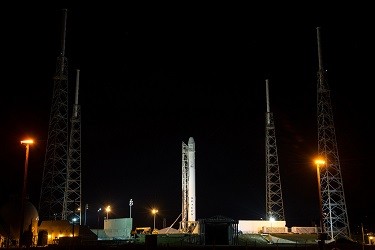
NASA's SpaceX rocket and its Dragon cargo capsule will be launched to the International Space Station on Monday 14 April (Tuesday, 15 April in India) despite a critical computer failure was found, affecting systems on the station, according to the officials.
The Falcon 9 rocket, along with the capsule, will blast off at 4:58 pm EDT (20:58 pm GMT and 2:28 am IST) from Cape Canaveral in Florida. The launch, which was earlier scheduled for mid-March, will supply over two tons of cargo.
The backup computer, located outside of the space station, failed to get activated on Friday, though the main computer operated perfectly.
"We're good to go," Weather Channel quoted Mike Suffredini, NASA space station program manager.
"There's a certain amount of urgency to go ahead and get these vehicles. These shipments have to fit around other space station operations, like crew comings and goings. Things start to bunch up and so we're just trying to fly as soon as we safely can, which is what we believe we're doing.
"SpaceX is carrying on board a number of critical systems, including a new spacesuit, components to fix the existing spacesuits, a couple of very critical research experiments in the trunk and quite a bit of logistics for our crew members on board. So we need to get it onboard as soon as we practically can," he added.
In 2012, SpaceX, owned by entrepreneur Elon Musk, along with its Dragon cargo ship, became the first commercial unit to the space station. The Dragon, a recyclable and gumdrop shaped capsule, was the first to reach the space station in 2012.
There are around 10 MDMs (Multiplexer/Demultiplexer) on the space station, controlling automated systems on the base. A spacewalk will be required to repair the computer.
"We had already determined that we were ready for the launch early last week, however, Friday afternoon one of our external MDMs failed," Suffredini said, referring to a backup command computer relay box.
The spacewalk will be performed by a pair of astronauts on 22 April and will give SpaceX two possibilities to get its unmanned Dragon capsule flying.
NASA was keen for the SpaceX rocket to fire its cargo to the base as quickly as possible.
(Ed: VP)

















